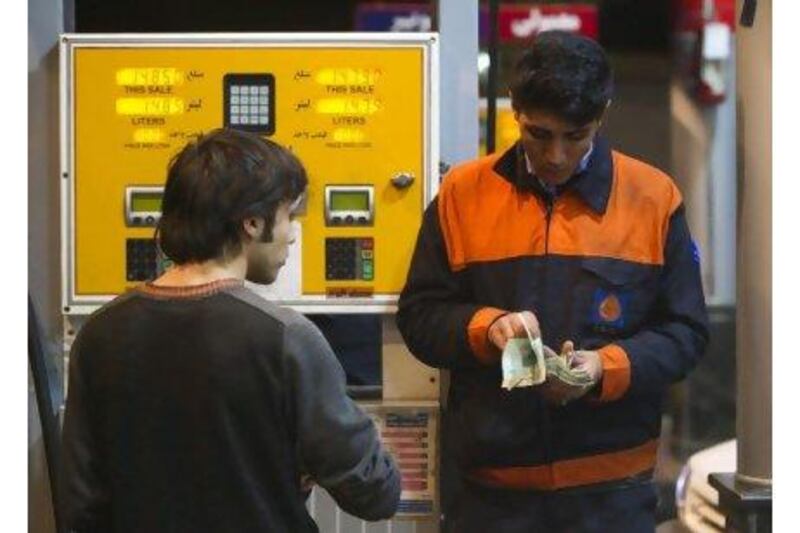TEHRAN // President Mahmoud Ahmadinejad's economic reform plan aimed at ridding the Iranian economy of an annual US$100 billion (Dh367bn) in energy and food subsidies took effect with the introduction of severalfold prices for gasoline, diesel and compressed natural gas on Sunday, amid tight security provisions.
Police and security forces were guarding gas stations and other sensitive establishments in Tehran and other major cities since Saturday to quell any possible riots or violence in reaction to introduction of higher prices. Heavy police presence in many major squares was noticeable but no violence was reported, unlike 2007 when the introduction of gasoline rationing led to riots in Tehran and a number of gas stations were set on fire.
For car owners, gasoline prices increased per litre to 4,000 rials (Dh1.5) from 1,000 with a monthly quota of 60 litres. The cost of diesel for trucks and public transit shot up more drastically, to 1,500 rials per litre from 160. And the cost of compressed natural gas, increased tenfold to 4,000 rials per cubic metre.
To soften the blow of the increases, the government introduced some measures that will allow most people to delay paying the price hikes for several weeks. In addition, the government has banned any increases in underground, bus and taxi fares for the next couple of months. However, there were reports yesterday out of Tehran that taxi fares in some areas immediately doubled.
New prices for kerosene, gas, water, electricity and bread are yet to be announced.
The cuts come as Iran remains deadlocked with the United States and its allies over Tehran's disputed nuclear programme. The United Nations Security Council slapped a fourth round of sanctions on Iran last summer over its refusal to halt uranium enrichment, and there are signs those penalties are taking a toll on the nation's economy.
Still, Iran had planned to slash subsidies before the latest sanctions took effect, and Mr Ahmadinejad and his allies have long insisted the country's oil-based economy could no longer afford the largesse.
To offset the impact of higher energy and food prices, the government is handing out cash payments to about 20 million families, worth an estimated US$15bn to date.
Mr Ahmadinejad, who announced the official start of the programme on state television on Saturday evening, called on people not to withdraw their compensation money from their accounts hastily and before they get their next utility bills two months from now. Cash payments will continue indefinitely and the amount may even double, he said.
He also vowed that payment of compensation for scrapping subsidies could raise the living standards of 60 per cent of the country's population. The rest, who consume more and will have to pay more, need to cut their consumption if they want to maintain their standards of living after subsidies are scrapped, he said.
The complexity of price charts and ambiguity about some aspects of payment plans for electricity and water, which will be based on the level of consumption, are confusing, some people say.
"It is too difficult to have a clear image of how the changes in the costs of various things like gasoline, gas and electricity will affect my life. The picture will only be clearer when the next utility bills arrive," said Hossein Haidari, 47, a civil servant in Tehran.
Mr Ahmadinejad said Saturday that the payments will increase by an extra 80,000 rials (40,000 rials a month per family member) in the next few days to compensate for removing bread subsidies, planned to be introduced soon.
The government pays US$4bn a year to subsidize bread, Mr Ahmadinejad said.
The increase in the price of bread will be affected by several factors, including the new costs of flour, electricity, gas, water and labour.
Many critics of the president, even from within the conservative camp, claim cutting subsidies will lead to stocking inflation and other woes if not cautiously and appropriately carried out.
"The foundations of our economy are not ready ... reactions of this living organism (economy) will manifest themselves as [higher] inflation, a wave of bankruptcy of businesses and possible dissatisfaction [of the population] if we fail to carry out a clean and radical surgery [of the economy]. We will then have to stop the plan which will have a heavy cost," conservative legislator Bahman Akhavan was quoted by Khabaronline, a conservation news site, as saying.
Official inflation rate now stands at 9.8 per cent. Critics claim implementation of the plan can raise the figure up to 50 per cent in the coming months.






